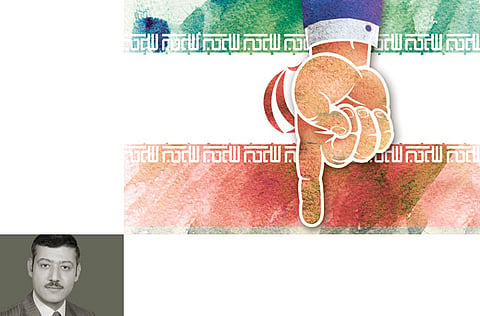It’s not about freedom, it’s all about Iran
Syria's foes have seized the opportunity provided by the crisis to try to change regional balance of power in their favour

As the US completes the withdrawal of its forces from Iraq by the end of next month, analysts and policy-makers are busy debating the impact of the US move on the regional balance of power. Many speculate that Iran would take advantage of the power vacuum ensuing and try to establish itself as the dominant power not only in Iraq but in the entire Gulf region.
Iran, on the other hand, is not making any efforts to mitigate these fears, felt particularly by its Gulf neighbours. Allegations about an Iranian covert operation to assassinate the Saudi ambassador to the US and attempts to stage attacks in Bahrain and orchestrate protests in the eastern province of Saudi Arabia have magnified these fears.
But this is not everything that the anti-Iran powers need to worry about in the region. Iran could emerge with a sphere of influence stretching from western Afghanistan to the Mediterranean. Many believe that the main Iranian threat in this case will not be nuclear but conventional. If Iran manages after the completion of the US withdrawal from Iraq to connect geographically the parts of so-called Shiite Crescent — i.e. add Iraq to the already existing axis of "resistance" which includes Iran, Syria and Hezbollah — that could change the political landscape of the region in a fundamental way.
Given the fact that most of the powers involved in this titanic twist have already accepted Iran's dominant position in Iraq, Syria, following the outbreak of its uprising, has emerged as the weakest link to stage a countermove against Iran and has hence become the main battleground to stop Tehran from completing its own axis. In addition to the US, the countries that are directly affected by the emerging situation and hence having huge stakes in the conflict in Syria are Saudi Arabia, Turkey and Jordan.
If Iran's sphere of influence were to exist, it would touch the northern borders of Saudi Arabia and Jordan and the southern borders of Turkey. For these three countries, the place to block it no longer is Iraq, where Iran already has the upper hand. Instead, it is Syria and the key move here is to do everything possible to bring about a regime change in Damascus.
Prior to the Syrian uprising which broke out last March, that was unthinkable. The regime in Damascus was very strong. It just emerged ‘victorious' from a decade-long diplomatic confrontation with the US to force it to change its policies concerning Iraq, Lebanon and relations with Iran, Hezbollah and Hamas.
At present, the polarisation is clear, taking a sectarian flavour for some. The Syrian opposition is supported by mainly Sunni countries with Turkey and the Arab League taking the lead, wherein Iran, Hezbollah and, intriguingly, Iraqi Prime Minister Nouri Al Maliki have constituted the Syrian regime's exterior support.
The failure of the Syrian opposition to bring down the regime, in eight months of persistent peaceful protests, has led several Sunni countries to think about offering more than mere diplomatic and political support. Turkey hosts the Free Syrian Army, a group of Sunni defectors, whereas the Gulf countries are leading a concerted effort within the Arab League to isolate the Syrian regime and punish it economically and financially. It is exactly for these reasons the Syrian regime is talking about a foreign conspiracy to topple it.
The regime tends to ignore however that eight months of brutal killing of peaceful protesters that provided the excuse for outside powers to intervene. Syria's regional and international foes have naturally seized the opportunity to try to change the regional balance of power in their favour. For them, this is not about Syria, it is not about freedom and democracy for the Syrian people either; it is rather about Iran and its rising influence. The only way to circumscribe Tehran, contain its rising power and prevent it from benefiting from the retreat of the US role in the region is to prevent a geographic connection between parts of the Shiite crescent.
The uprising in Syria provided a golden opportunity and they would benefit from it to the maximum. For Syrian protesters, the regional balance of power is their last concern. They do not really care about the complexities of the regional and international contexts. All they want is to achieve good governance, accountability, freedom and dignity. If, for some reasons, their interests and the interests of the regional powers overlap or coincide, it is something that they cannot really do much about.
Dr Marwan Kabalan is Dean of the Faculty of International Relations and Diplomacy, Kalamoon University Damascus, Syria.
Sign up for the Daily Briefing
Get the latest news and updates straight to your inbox



